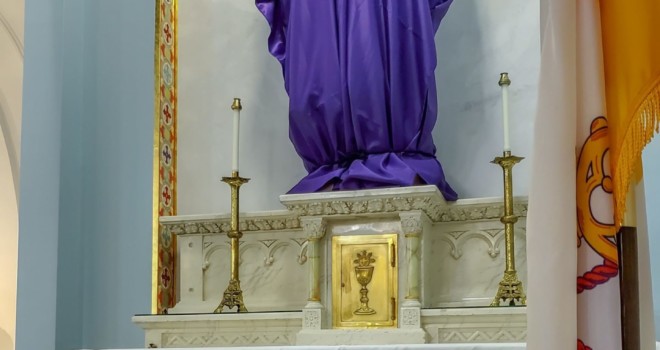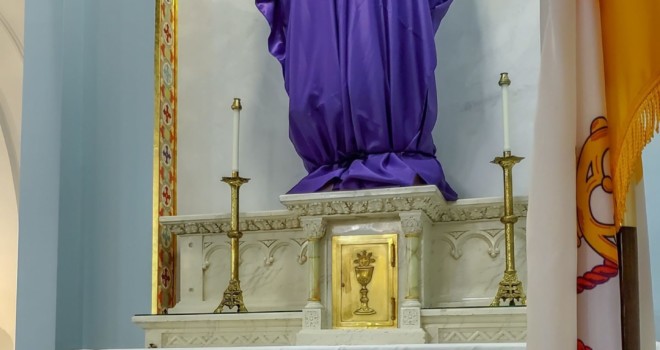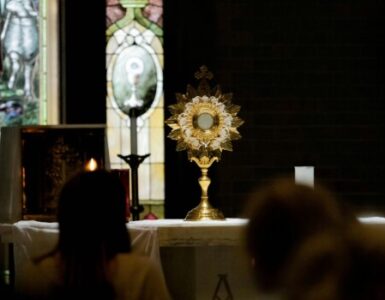The Lenten season is once more upon us. It is a time to sacrifice through penance, seek greater intimacy with God in prayer, and give to those in need. These are all things we should be doing all year long, but Lent heightens our awareness and draws us away from the things of this world into the desert with Our Lord where we can be purified through self-imposed mortifications. This purification is the path to greater love.
The process is not meant to be easy. In fact, it should be painful, because we are called to put to death our own self-love for love of God and in order to love others. This causes us considerable agony due to our sinful nature. We are reminded that we are to seek the spiritual above the bodily. We are body and spirit, but the spirit is meant to be the master of the body. In our fallen sinful state, it is the body with the senses that typically rule over us.
Lent is an opportunity to grow in charity through the call to die-to-self. By a gratuitous gift from God, the supernatural virtue of charity is being poured out on us in abundance. The limitation of charity does not happen on God’s end. It happens within each one of us. We decide whether or not we will love God above all else and our neighbor as our selves in each moment of the day. Very often we fail in both areas because of sin or weakness on our own part.
It is through the Lenten season that we focus on three of the great spiritual weapons Christ gives to us on the path to holiness: prayer, penance, and almsgiving. Often we know we need to pray and that all of us should be praying more. We know we should give to the poor. What we may not realize is that prayer is heightened through penance. All of the saints of the Church lived lives of prayer and penance. The more we discipline our bodies, the more the Holy Spirit can draw us into deeper intimate union with the Most Holy Trinity through prayer.
Mortification of the flesh allows us to be freed from the material things of this life that weigh us down or occupy too great a place in our lives. When we turn to offering penances through various mortifications, we very quickly discover that within us are countless false idols clamoring to be in place of God. These same sins or vices keep us from being able to love our neighbor freely because so often they lead us to cling to our own selfish desires. We no longer see the higher good—the person—in front of us. Instead, we want whatever pleasure is before us.
We often put God after everything else we want to do. Most of us complain that we simply do not have enough time to pray because we are too busy. Upon further examination, however, we discover that we have ample time for social media, television, or any other distraction that keeps us from praying. If we turned away from the screen for a few minutes we could easily spent time in Sacred Scripture, pray a Rosary, or a Divine Mercy Chaplet. Time isn’t the issue. It’s our priorities, which is why Lent is such a blessed season in how it reorients us to God through a temporary turning away from these goods.
It’s not that the things of this world are evil and should be detested. God’s creation is good. The problem is that we have an inordinate attachment to the things of this world that keeps us from turning to God. We are not made to dwell here forever. We are made for heaven and the only way we can prepare for the supernatural goods of eternal life is through a turning away from the material goods of this life towards God with greater attention. Penance is this turning away, and the more we persevere in penance, the more we will discover our souls growing in charity.
One way we can embrace the hardships of Lent with greater joy is by re-orienting our sacrifices to God’s greater glory and to love of our neighbor. The Church’s teaching on redemptive suffering shows us how our sacrifices and sufferings united to Christ Crucified for the sake of others can help us walk through Lent with joy despite the great difficulties we may encounter in seeking to die-to-self in prayer, penance, and almsgiving.
We are not only seeking to grow in greater holiness for ourselves, but our sacrifices—when offered to Christ through the Immaculate Heart of Mary—will be used to help those around us grow in holiness as well. We are not on this pilgrimage alone. In the beautiful book In Sinu Jesu—which is the diary of a Benedictine monk in prayer before the Blessed Sacrament—Our Lord tells this priest-adorer about the gift of redemptive suffering:
You cannot see from where you are in this life now the power and value of sufferings united to My own. Anything given to Me, anything placed in My priestly hands, I lift up and offer to the Father, covered with My Precious Blood. It is this that makes your sufferings, even the smallest ones, precious to Me, and precious in the sight of My Father.
Penances are small sacrifices, which are a type of suffering, that can be offered to Christ for others. This movement outwards in love towards Our Crucified Savior and our neighbor often lessens the difficulty. It is still a battle to fight against the flesh, but the sweetness of charity makes the sacrifices taste less bitter. This is because charity is the ultimate path to freedom. The entire litmus test for this life is charity.
Lent is an opportunity to grow in the spiritual goods in order to rightly order our bodies to God, but it is also a time when we can offer our suffering for the needs of others. Both increase our capacity to love. The more we love God, the more we will love our neighbor. We often compartmentalize too much of the spiritual life. Everything is interconnected in astonishing and mysterious ways known by God alone.
As we go through these next 39 days of Lent, let us focus on offering our prayers, penances, and alms with a genuine spirit of charity. Remembering, as St. Catherine of Siena said: “Nothing great is ever achieved without much enduring.” A truly great love of God and others will cost us everything in this life, but the rewards in the next life will make all the sufferings and sacrifices worth it. With that in mind, we can embrace the difficulties of this holy season joyfully.
Pain is the chalice of love.
Servant of God Catherine Doherty
✠
Photo by Shalone Cason on Unsplash












